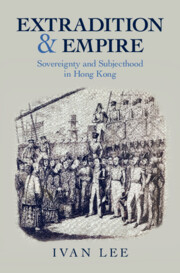Book contents
- Extradition and Empire
- Studies in Legal History
- Extradition and Empire
- Copyright page
- Contents
- Illustrations
- Acknowledgements
- Abbreviations of Archival Sources
- Introduction
- 1 Improvising Sovereignty
- 2 Domesticating Mobility
- 3 Navigating Disorder
- 4 Rationalising Reciprocity
- 5 Founding Alsatia
- Conclusion
- Notes
- Index
- Studies in Legal History
5 - Founding Alsatia
Published online by Cambridge University Press: 10 September 2025
- Extradition and Empire
- Studies in Legal History
- Extradition and Empire
- Copyright page
- Contents
- Illustrations
- Acknowledgements
- Abbreviations of Archival Sources
- Introduction
- 1 Improvising Sovereignty
- 2 Domesticating Mobility
- 3 Navigating Disorder
- 4 Rationalising Reciprocity
- 5 Founding Alsatia
- Conclusion
- Notes
- Index
- Studies in Legal History
Summary
This chapter tracks the modernisation of the extradition law of Hong Kong against the backdrop of empire-wide legal reform. In 1865–73, two explosive scandals caused imperial officials and judges to impose belated restrictions on the colonial removal of fugitives to China. The first, the case of How Yu-teen (1865), involved embarrassing allegations of British complicity in China’s violent execution of a political refugee; the second, Attorney General of Hong Kong v. Kwok-a-Sing (1873), was a habeas corpus dispute born of colonial infighting and the only extradition dispute to reach the Judicial Committee of the Privy Council in the nineteenth century. These scandals propelled Hong Kong away from the flexible and jurisdictional practice of rendition, as imperial officials ignored colonial fears of establishing a Chinese ‘Alsatia’ – a disreputable refuge for Chinese criminals. The new reality – the imperially homogenous, late-Victorian law of extradition – carried drastically heightened and irreversible expectations of individual rights and executive comportment.
Keywords
Information
- Type
- Chapter
- Information
- Extradition and EmpireSovereignty and Subjecthood in Hong Kong, pp. 150 - 184Publisher: Cambridge University PressPrint publication year: 2025
Accessibility standard: WCAG 2.0 A
Content Navigation
Allows you to navigate directly to chapters, sections, or non‐text items through a linked table of contents, reducing the need for extensive scrolling.
Provides an interactive index, letting you go straight to where a term or subject appears in the text without manual searching.
Reading Order & Textual Equivalents
You will encounter all content (including footnotes, captions, etc.) in a clear, sequential flow, making it easier to follow with assistive tools like screen readers.
You get concise descriptions (for images, charts, or media clips), ensuring you do not miss crucial information when visual or audio elements are not accessible.
You get more than just short alt text: you have comprehensive text equivalents, transcripts, captions, or audio descriptions for substantial non‐text content, which is especially helpful for complex visuals or multimedia.
Structural and Technical Features
You gain clarity from ARIA (Accessible Rich Internet Applications) roles and attributes, as they help assistive technologies interpret how each part of the content functions.
